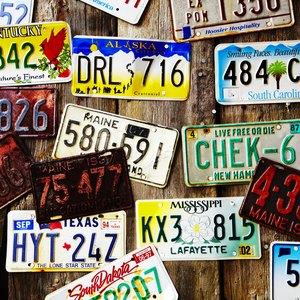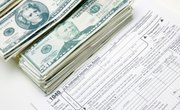
If you own a vehicle, each year you pay a fee to renew it. You may not have considered the possibility of claiming that fee when you file your federal or state taxes. In many states, that isn’t even an option. However, if part of the fees you pay are classified as personal property tax, you have the option of claiming them with your other personal property taxes when you file.
Tips
You can claim part of your license plate fee as a deductible expense if you live in a state where the fee is classified as personal property tax. Currently, more than half of the states impose a personal property tax on automobiles.
Claiming License Plate Fees
In order to determine whether you can claim your license plate fees, you’ll need to first figure out the type of fee you pay each year. Slightly more than half of all states charge a personal property tax on vehicles each year, and in those states, the average cost to renew your fees is $423 each year. There is no Illinois car registration fee tax deduction, for instance, because you pay a set fee of just over $100 to renew your tags each year, rather than paying a tax on the vehicle itself.
If you drive your vehicle for work, you may be able to claim the fees as a work expense, especially if you’re self-employed or you own your own business. Your car will need to be used for business and you’ll need to use the actual expenses method of claiming your car, rather than claiming mileage.
Exceptions for Non-Tax Fees
You can only claim the portion of your fee that’s based on the value of your car, not any ancillary fees that are part of registering your vehicle each year. When you pay your Michigan license plate fees, for instance, you'll pay the amount that is based on your vehicle’s value, as well as a $5 fee if you need a new plate and a $15 vehicle title fee. If you renew your tags late, you’ll be required to pay a $10 late fee. None of those additional fees is tax deductible, so you’ll need to subtract those from what you submit at tax time.
2018 Taxes and Personal Property Cap
The Tax Cuts and Jobs Act puts a cap of $5,000 per single filer for your combined personal property taxes. If you’re married filing jointly, that cap increases to $10,000. For households with multiple vehicles, including luxury items like boats and RVs, it may be fairly easy to reach that limit during the tax year.
2017 Taxes and Unreimbursed Expenses
If you drive your vehicle for work and your boss doesn’t reimburse you for your registration, you may be able to claim the portion of it you use for work, assuming you use the actual expenses method of calculating. Be careful, though. If you register a vehicle in Texas, for instance, and it is deemed to be used for income-generating purposes, it will kick your vehicle into qualifying for personal property tax when you wouldn’t qualify for it otherwise.
References
Writer Bio
Stephanie Faris has written about finance for entrepreneurs and marketing firms since 2013. She spent nearly a year as a ghostwriter for a credit card processing service and has ghostwritten about finance for numerous marketing firms and entrepreneurs. Her work has appeared on The Motley Fool, MoneyGeek, Ecommerce Insiders, GoBankingRates, and ThriveBy30.
